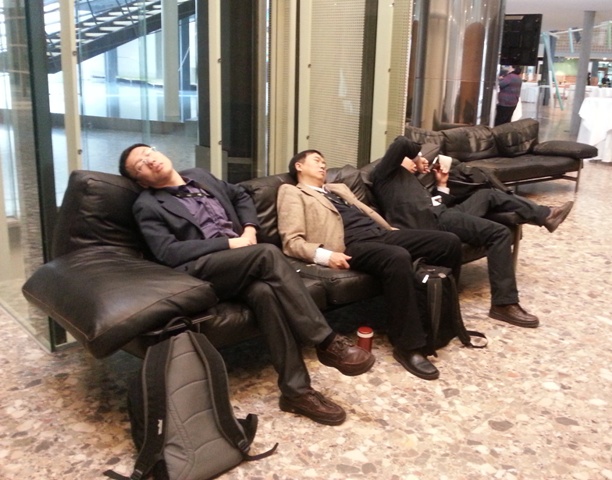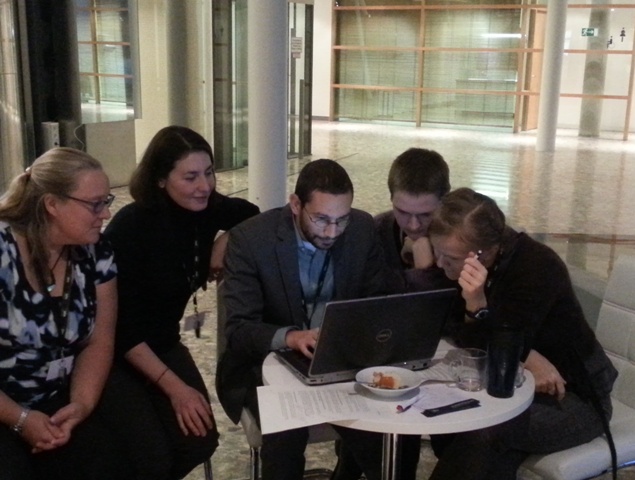It’s Wednesday, day three of IPBES, but it feels like Thursday. When the alarm clock rang early this morning, I fancied it was Sunday, yearning briefly for the opportunity of more rest. It’s been a busy week.
There’s a lot of work to do, and a great urge among us to get it done. According to the Chair’s estimation at the closure of Wednesday’s Plenary, just a quarter of the work of IPBES is complete.
 |
| Delegates find time for a nap on day three of IPBES at the World Conference Center in Bonn, Germany |
While there’s a lot to do, much has been achieved and discussed. The IPBES Bureau has been established and there is a broad consensus on a need to keep the Bureau and the Multidisciplinary Expert Panel, the group responsible for the scientific and technical functions of IPBES, independent (that is, to keep politics away from science). There is broad agreement that the MEP should commence ASAP; but there is also very meticulous, tiresome discussion on the actual structuring of MEP.
This discussion required several hours of high concentration and attention. We searched for the best moment to intervene in the discussion and add our humble but important comment that perhaps some selected members of the public should be allowed to participate as observers in the meetings of the MEP. We care about this because it could be an important way to ensure transparency and the full participation of various stakeholders in IPBES. For this reason we also have reservations on the election process of the MEP, which is built on negotiations between governments, but without a systematic process of ensuring balance of expertise.
This morning several representatives of the “we” (Stakeholders, that is) met to discuss how to best intervene in the discussions on “Rule 28” of the rules of procedure for IPBES. Rule 28 deals with the MEP structure. We want to ensure the participation of various stakeholders (conservation organizations, indigenous peoples, government agencies, business and industry representatives, and scientific societies) in IPBES. Rule 28 provides an opportunity to ensure this happens. And now comes the moment to speak: no, not now, in a few minutes. Now? No, later. Or maybe now? No, later. But wait, someone mentions the public. Someone else immediately says no.
 |
| SCB's IPBES delegates Carolyn Lundquist (left) and Guy Pe'er (center) work with other Stakeholders on the Stakeholder Engagement Strategy on day three of IPBES |
“To speak or not to speak”, that is the question. If we speak against the general opinion and receive no support from other delegations, we may create antagonism, miss our (narrow) chance of speaking, or even harm our credibility or reputation. And if too many of the stakeholders raise a hand, we could be excluded later on from discussions. The consequence of cautiousness: silence on our behalf. While waiting, we slowly realize that perhaps the text we wish to propose to Rule 28 does not actually fit where we wish to have it.
|
----------------------------
More on Day Three
On Day three of IPBES-1, the Plenary began with another morning Stakeholder group meeting, where we word-smithed draft text to introduce to the Plenary to provide for intersessional work to draft a Stakeholder Engagement Strategy.
We had a pleasant surprise in the afternoon, as a new document was provided with a draft Work Program, which included preparation of a draft Stakeholder Engagement Strategy. Our voices in our combined Stakeholder interventions to date, and our networking with Plenary Members, appear successful; though this task still needs to be approved in Plenary session.
Most of Day three was spent in contact groups on this Work Program or on Rules of Procedure, with some changes to the draft Rules of Procedure guiding observer participation in IPBES, with our interpretation of these changes implying that most governments are in favor of full inclusion of observers in all aspects of IPBES (Plenary, MEP, Bureau).
- Carolyn Lundquist
---------------------------------------------- |
Another hour passes and here comes “the moment,” or so we thought. The Chair finally concludes the discussion on the words “members” or “observers”, and the discussion on Rule 28 is about to be concluded. “If there are no more questions,” the Chair said, “we proceed to Rule 32”. An IUCN representative next to me lifts his arm to express the point that was meticulously phrased by our group this morning (namely, that a section in Rule 28 might be completely missing). Unfortunately, the Chair has his eyes and hands on his sheet of paper and shifts to the next page and next topic.Time’s up, sorry.
But good news comes. It’s not at all too late! Such five-second windows of opportunities are not a singularity in space. Procedures decided now could change in the future. And finally, and much more importantly, there is very broad support of our message that participation of various stakeholders is essential to the success of IPBES and as is the development of a “Stakeholder Engagement Strategy.”
You may imagine that we already spent some hours on a first version of such a strategy, or at least a proposal for developing it. It will probably receive dozens of edits by Saturday when a member of the “we” reads it at the Plenary.
You might imagine that, at the end of such a day, everyone walks somewhat shakily. I guess I am not the only one who wished it were Thursday, but I’m happy it’s only Wednesday. So much work lies still ahead.
Blog Posts from SCB's IPBES Delegation
SCB IPBES Resources
- Former SCB President Tom Lovejoy's Op-Ed on IPBES in the New York Times
- IPBES Stakeholder website (click on Stakeholder tab)
- Stakeholders' Day presentation from Carolyn Lundquist
- Conservation Biology editorial - IPBES: Opportunities and Challenges for SCB and Other Learned Societies
- SCB's IPBES Web page
- SCB Position Statement for the first IPBES plenary
- IPBES Website
- IISD Reporting Services - IPBES